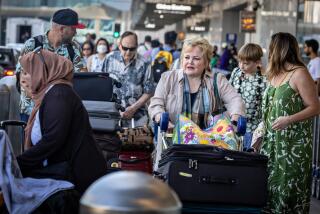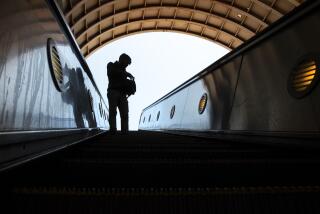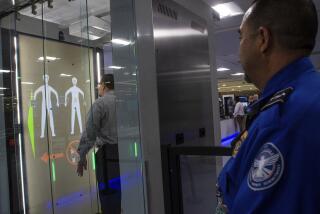The TSA’s unsustainable air security strategy
- Share via
The deployment of body scanners at U.S. airports is rightly controversial. The devices raise very important privacy issues, and possibly health issues as well, both of which The Times’ Nov. 17 editorial “Shut up and be scanned” says are outweighed by security concerns.
One downside to this debate, however, is that it distracts us somewhat from asking important questions about the Transportation Security Administration’s approach to security overall.
The scanners are part and parcel of what has become an unsustainable security strategy; that is, treating each and every passenger, whether an infant child or a uniformed crew member, as a potential terrorist, while attempting to inspect their bodies and belongings for each and every possible weapon. This is an unrealistic, ultimately self-defeating approach in a country where more than 2 million people fly daily.
The body scanners are also the latest turn in what is destined to be an unwinnable arms race. First came Richard Reid, the so-called shoe bomber, and the TSA decreed that all passengers must remove their shoes. Then came the Christmas Day underwear bomber, and as a result we are being body scanned and groped. Almost unbelievably, here we are, literally strip-searching the flying public, from preschoolers to pilots. What comes next? The simple if uncomfortable fact is that we cannot protect ourselves from every conceivable threat. Short of turning our airports into fortresses, there will always be a way for a clever, resourceful-enough perpetrator to skirt whatever measures we put in place.
That’s not capitulation, it’s simple reality, and it further requires us to acknowledge that the real nuts-and-bolts of thwarting an attack is not the job of a TSA concourse screener in the first place. It’s the job of the FBI, CIA, Interpol and other agencies. It’s the job of law enforcement and counterintelligence. Old-fashioned detective work is a lot more likely to save lives than a TSA screener arguing with someone over the size of a shampoo bottle.
That’s not to say that airport screeners don’t play an important role. But they do so only if that role is executed properly. Concourse security needs to be rational, efficient and effective. Ideally we would see a leaner, scaled-down version of the system that exists, one that is focused less on looking for weapons than looking for people who might use weapons.
And where is our sense of historical perspective? Civil aviation has been a target of terrorism for 50 years. Between 1985 and 1989, for example, there were at least seven high-profile terrorist attacks against commercial aviation, including three horrific bombings that killed nearly 1,000 people. What have we learned? What have we done?
At our peril, we’ve allowed the attacks of 2001 to become the sole reference point of almost all of our airport security decisions, the biggest irony being that the success of the 9/11 attacks had almost nothing to do with airport security in the first place. Had box cutters been banned on Sept. 11, 2001, the 19 hijackers would have relied on something else; something as simple as pencils would probably have sufficed. They weren’t relying on weaponry, they were relying on the element of surprise, taking advantage not of a loophole in security but a loophole in our mindset — that is, our understanding and expectations of hijackings at the time.
The genius of 9/11 is that, short of the hijackers chickening out, the plot was guaranteed to succeed. Just the opposite is true today. Yet, depressingly, much of what we see at the airport is engineered to thwart an attack that, for all intents and purposes, already happened and can never happen again.
Amazingly, we fuss and fidget over corkscrews and hobby knives, yet cargo and packages coming from overseas go unscreened for the most potent threat of all: bombs and explosives. And here we are deploying tens of millions of dollars in anti-terrorist technology at domestic airports, while many of those overseas — from which hundreds of U.S.-bound flights depart weekly — remain comparatively porous.
The ongoing conversation should not be about body scanners per se. It should be about our entire airport security philosophy. Are we looking at the hierarchy of threat from a big-picture perspective, or are we merely reacting, hysterically, to the latest scare?
Patrick Smith, an airline pilot, is the “Ask the Pilot” columnist for Salon.com. His website is askthepilot.com.
More to Read
Inside the business of entertainment
The Wide Shot brings you news, analysis and insights on everything from streaming wars to production — and what it all means for the future.
You may occasionally receive promotional content from the Los Angeles Times.










